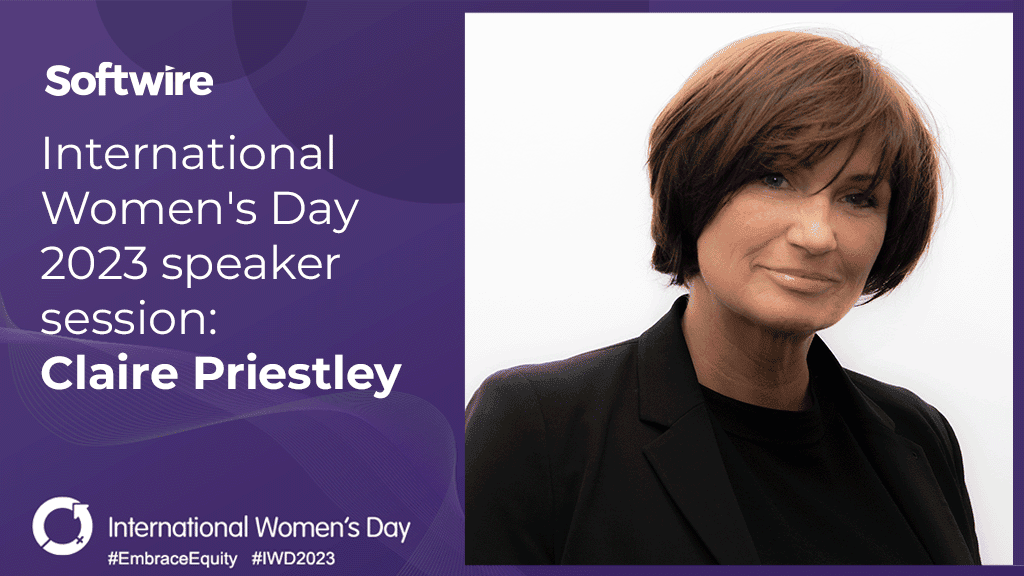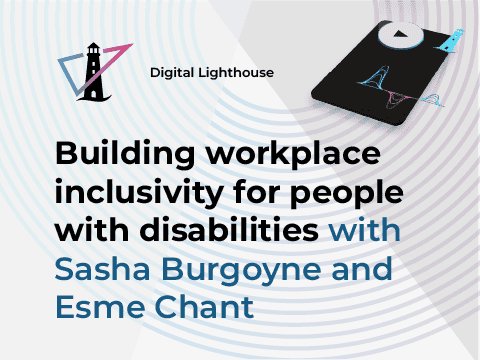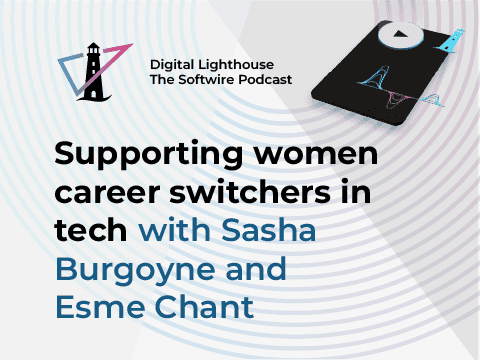

As part of our celebrations of International Women’s Day 2023, we were delighted to welcome Claire Priestley for a lunchtime chat with Softwire Director, Zoe Cunningham.
Claire has held senior IT leadership roles in a variety of public sector, commercial and higher education organisations, including City, University of London, the Royal Borough of Kensington and Chelsea, and will shortly be joining the London School of Economics as CIO.
During the session with Zoe, Claire talked openly about different ways she’s overcome challenges in her career. She also shared her views on what the industry needs to do to attract and retain more women. (Watch the recording of the event below!)
We’ve picked out some event highlights, which we hope provide inspiration for individuals and organisations alike, as we all seek to further increase diversity and inclusion in the sector.
How the technology industry can do more to help women
Affinity groups aren’t necessarily the solution
Claire acknowledged this was a controversial opinion, but felt that ‘women in tech’ and other such affinity communities, which are sometimes exclusively for people from the underrepresented group, aren’t the way to tackle the hurdles these people face.
She pointed out that the problems don’t lie with the women themselves, but are down to systemic issues in the industry, which are making women choose careers in other areas. Responsibility for solving these shouldn’t (and indeed can’t) lie with women, but instead needs everyone around the table, listening to the challenges and working together to solve them.
Focus on the positives and elevate role models
Zoe noted that the narrative around women in tech needs to evolve to be altogether more positive. The amount of material focusing on the challenges women face when trying to get into and stay in tech, she suggested, will be putting people off. When they read about the hurdles they’ll face, who would blame girls at school for pursuing a career a sector that appears more friendly towards women?
Instead, she urged the industry to focus on the positives. What are the great things about being a woman working in technology? Who are the success stories? We all need to elevate these role models, so that girls and women get a chance to see people like them in senior tech roles.
As part of this, Claire also highlighted the importance of showcasing the variety of roles on offer. These go far beyond what some might typically associate with IT, such as development or systems administration.
Claire’s advice to other women in tech
Be brave
When discussing the attributes someone needs if they’re to forge a successful career in any industry, ‘confidence’ is often cited. Claire challenged this viewpoint, noting that confidence is transient: someone may be incredibly confident in one situation, but not in another.
In reality, what she felt she’s repeatedly needed to show, has been bravery. She reflected on situations where she’d needed courage to say or do something that made her feel uncomfortable, but revealed that in most cases, the experience was a lot more positive than she’d expected.
Recognise and appreciate what you have to offer
With so many people in technology roles having followed similar education and career paths, there’s often an expectation around what skills people in senior IT roles need to have. Claire revealed she’s often come across the ‘you’re not a traditional techie’ scepticism, which can be very daunting for those coming into the tech sector from other careers.
She said she quickly had to, in her own mind, acknowledge what she brought to the IT roles from previous jobs, and the value of these transferrable skills. In her case, she mentioned energy, positivity and resilience. Everyone will bring their own unique value to a role, and she reiterated the point that having a greater diversity of voices on your team, makes good business sense, as well as all the other benefits.
Identify and nurture allies
One of Claire’s really positive experiences as a woman working her way up the tech career ladder has been the discovery that there will always be people looking out for her interests and those of women more generally – and these haven’t always been the individuals she’d expected.
She and Zoe talked about how they’ve found that most men want to be allies to female colleagues, but that there’s a lot of uncertainty among men about how best to do this. Claire’s advice here, drawing on her own experiences, has been to speak to male colleagues about how she felt they could best be supportive in a range of scenarios.
Have a stock set of phrases and techniques for uncomfortable situations
Despite the many positives, the sad truth is that many women working in technology have experienced some level of sexism during their careers. When this happens, it can take you aback. You may well want to say something, but might not immediately be able to find the right words. Claire suggested having a set of practised ‘stock phrases’ to use as responses in certain situations, either to make clear that what happened wasn’t OK, or to give you a moment to collect your thoughts and formulate your response.
One she mentioned she sometimes uses is, “Did you just mansplain me?” Another suggestion was to explain, “When you said X, it made me feel like Y,” as a way of letting men know the impact of their words, either immediately, or afterwards in private.
Watch the full event
Read the transcript (Word document, 60kb)
Learn more about our D&I activities
You can explore our other diversity and inclusion content , including podcasts and blog articles, on our website.
For more information or to get in touch with us to discuss this topic, please connect with us through our Contact Us form.


